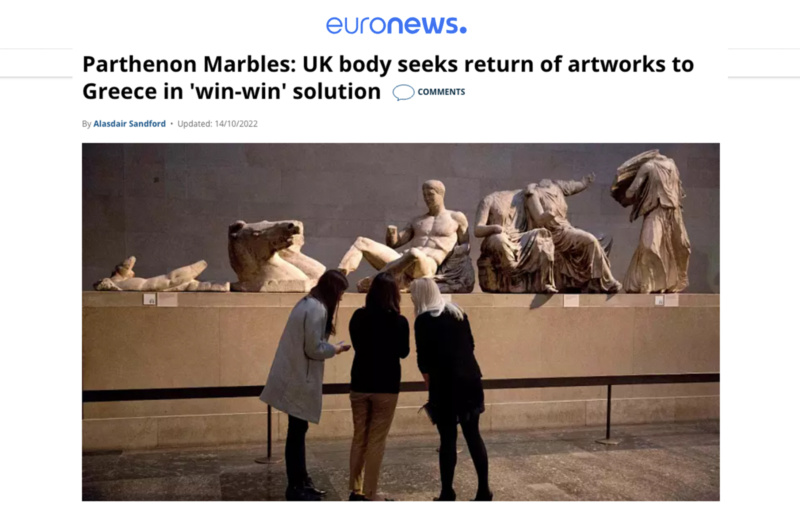Moves are afoot in the UK to return the Parthenon Marbles to Greece, after a years-long tug-of-war between London and Athens.
Lord Ed Vaizey, a former Conservative culture minister, is to chair a new advisory board that aims to repatriate see the historic Greek artworks.
Writing in The Times newspaper he stressed he wants to use the 40th anniversary of the 1983 Heritage Act to bring a motion before the House of Lords to debate ‘contested heritage’.
“We need to debate whether it still works for what we need today. What was not accounted for or considered back in 1983 were restitution requests and the idea that trustees might want to return artefacts to their place of origin,” said Vaizey.
The ancient sculptures — known in Britain as the Elgin Marbles, taken from Athens to London in the 19th Century — are the most high-profile example in the debate about whether museums should send artworks back to their countries of origin.
Greece has campaigned for decades for them to be returned.
Vaizey recently visited Athens with the Parthenon Project, which was set up by a Greek businessman aimed at convincing London to return the artworks. “I fully support their approach” for a “win-win solution”, he was quoted as saying.
In early October Vaizey retweeted an article in the Spectator quoting him telling a fringe event at the Tory party conference that the “moral case” for their repatriation was “absolutely unarguable”.
“The Parthenon sculptures belong in the Parthenon,” he said, adding that Greece had a “world-class museum” in which to house them.
A potential deal is said to involve an exchange of artefacts between Britain and Greece.
The actor Stephen Fry, also a member of the advisory board, has said he now feels there is “a real chance of a solution that brings benefit, honour and pride to both Britain and Greece”.
On Thursday the UK’s upper parliamentary chamber the House of Lords is due to debate a review of the 1983 Heritage Act, which restricts selected museums from disposing of objects in their collections.
Vaizey has tabled a question asking what plans the government has to review the act. In September, a junior minister said the government did not “think there is a case for further changes to the law”, adding that its position was the “right one at the moment”.
Boris Johnson’s government adopted a “retain and explain” policy on contested heritage, advising museums not to remove items from their collections even if they were not covered by the 1983 legislation.
“Removing difficult and contentious parts of it risks harming our understanding of our collective past,” wrote the then culture minister Oliver Dowden in September 2020. “Our aim should be to use them to educate people about all aspects of Britain’s complex past, both good and bad.”
“It’s one thing to have a bit of fun to feed the tabloids, quite another to start issuing directions” to museums and other bodies, Ed Vaizey said in an interview in March 2021.
In July this year, the director of the Victoria and Albert Museum, Tristram Hunt, argued that the law needed to be changed, to allow national museums more freedom to decide what to do with cultural artefacts.
The Elgin Marbles were removed from the Parthenon in Athens in the early 19th Century by the British soldier and politician Lord Elgin.
The British Museum in London, which now houses them, says Elgin had gained permission from the relevant Ottoman Empire authorities at the time.
In June the museum said it would support an arrangement which could see the marbles shared with Athens, insisting however that they remained an “integral part” of the UK collection.
British public opinion is increasingly in favour of repatriation: a YouGov survey found that 59% of respondents believe that the marbles taken by Lord Elgin belong to Greece, compared to 37% in 2014.
How Can You Get Involved?
If you would like to join the efforts to reunite the Parthenon Sculptures in Greece through a cultural partnership and receive emails with campaign updates from Pagefield Communications, please subscribe below.
For press enquiries, please contact Pagefield Communications at parthenonproject@pagefield.co.

